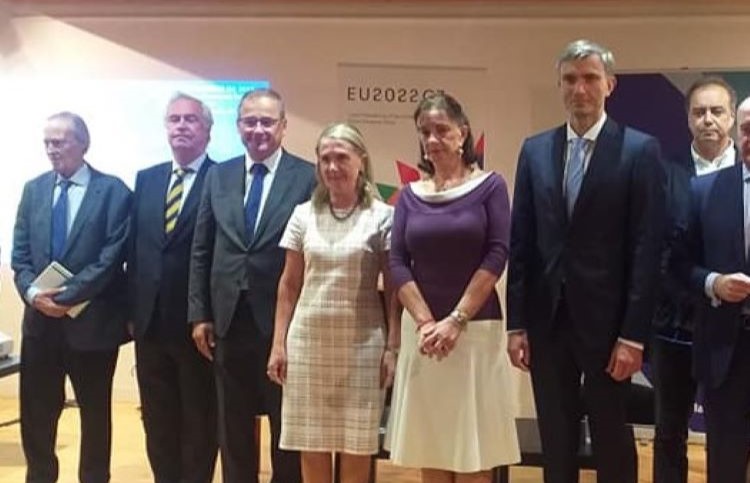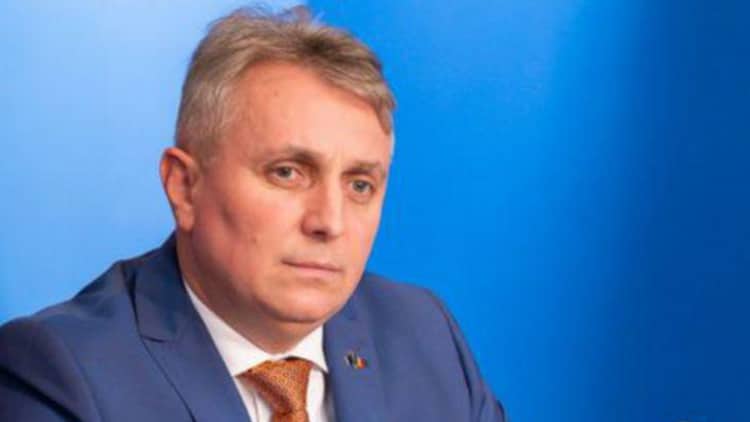Eduardo González
The Minister Counselor of the Ukrainian Embassy in Spain, Dmytro Matiuschenko, yesterday defended his country’s proposal for the creation of a special criminal court to investigate and try “the crime of Russia’s aggression”.
“We require greater unity and effort to end this war,” declared Matiuschenko during his speech at the event War in Ukraine: time for European unity, organized in the Auditorium of the Carlos de Amberes Foundation in Madrid by the Czech Embassy in Spain – in the framework of the Czech Presidency of the Council of the European Union – in collaboration with the Carlos de Amberes Foundation, the Elcano Royal Institute and the OHLA infrastructure group.
In the opinion of the Minister-Counsellor, the “victory of Ukraine in the war” requires, above all, three requirements: “increased pressure through sanctions on the aggressor state, in all areas and at all levels”, a “criminal response for those responsible in the Kremlin and the military perpetrators of war crimes” and an increase in political and military aid from the EU to Ukraine.
Regarding the second point, he warned, it is necessary “to do everything possible to bring Vladimir Putin and the Russian leadership to international justice.” Therefore, he announced, “Ukraine has proposed the establishment of a special criminal court to investigate and try the crime of Russia’s aggression and we hope that countries will support Ukraine.”
As for the third requirement, Dmytro Matiuschenko acknowledged and thanked the “EU response to Ukraine since February 24 (day of the invasion), which was unanimous, strong and swift, especially humanitarian”, but “we need more”. “A bigger vision is needed, the war cannot be won at the moment with conventional concepts, Ukraine needs broader political support” and, from the military point of view, the shipment of “heavy weaponry, which Ukraine needs so much at the moment,” he warned.
Also, he explained, “Ukraine’s goal is to integrate into the family of European countries.” “In June we received the status of a candidate country for future EU membership and we are working hard to fulfill the seven requirements put forward by the Commission to get to the next step and be able to proceed to negotiate membership,” he continued. “We hope to meet the seven objectives this year, in October, so that the EU will pronounce itself without delay and we can soon open the next step of the negotiations; we hope that during the Spanish Presidency the next step for EU accession will have been fulfilled,” he concluded.
For his part, the Czech Republic’s Ambassador to Spain, Ivan Jančárek, warned that, “for Europe and for the whole world, it is very important not to return to the 19th century, when the great empires decided the fate of the great nations.” Therefore, he stated, “the Czech EU Presidency has chosen to strengthen Europe and to have Ukraine at the top of its priorities.”
“Europe does many things by supporting the brave Ukrainian people: militarily, by sending arms and training the armed forces”; economically, by financing “plans for the reconstruction of Ukraine” thinking “about the economic future of Ukraine” and, politically, and “following the decision of the European Council in June to grant it the status of a candidate country, by supporting Ukraine in the process of reforms to bring it into line with the EU”. As for sanctions, he recalled, “six packages of sanctions” have been approved, but “we must all be united in other areas and there is not enough commitment” in some areas, such as visas, he regretted.
At the same event, the director of the Coordination Office for the Spanish Presidency of the EU, María Aurora Mejía, said that Putin has made “several mistakes.” “He thought he was dividing Europe and what he has done is to unite us more,” she said. “The war in Ukraine has integrated the EU more, contrary to what Putin thought,” she added.
The presentation of the event was followed by a debate moderated by Xavier Mas de Xaxàs, diplomatic correspondent of La Vanguardia and special envoy to Ukraine, with the participation of Josep Piqué, former Foreign Minister of Spain; Jan Marian, envoy of the Czech Foreign Minister for the Eastern Partnership; Ivanna Klympush-Tsintsadze, president of the Ukrainian Parliament’s Committee on the Integration of Ukraine into the EU (by telematic means); and Charles Powell, director of the Elcano Royal Institute. The meeting was closed by María Ángeles Benítez, Director of the Representation of the European Commission in Spain.







